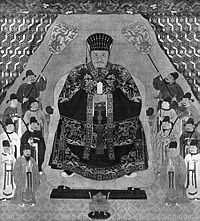Shō Kei
From Wikipedia, the free encyclopedia
| Shō Kei 尚敬王 | |
|---|---|
 | |
| Official royal portrait of Shō Kei | |
| | |
| 1713–1752 | |
| Predecessor | Shō Eki |
| Successor | Shō Boku |
| Issue | |
| Shō Boku, Crown Prince Nagakusuku Shō Wa, Prince Yuntanzau Chōken (founder of Yuntanzau Udun) Princess Tsukayama (Sai On's daughter-in-law) Princess Zukeran Princess Makadotarugane | |
| House | House of Shō |
| Father | Shō Eki |
| Mother | Kikoe-ōkimi-ganashi |
| Born | August 3, 1700 |
| Died | March 14, 1752 |
| Burial | Tamaudun, Shuri |
Shō Kei (尚 敬, 1700–1752) was king of the Ryūkyū Kingdom (today Okinawa Prefecture, Japan) from 1713–1752. His reign, strongly guided by royal advisor Sai On, is regarded as a political and economic golden age and period of the flowering of Okinawan culture.[1]
After succeeding his father Shō Eki in 1713, Shō Kei appointed his regent and trusted advisor Sai On to the Sanshikan, the Council of Three top royal advisors, in 1728. His reign is known for a great number of developments, including economic reforms and conservation efforts implemented under the guidance of Sai On, political changes, and scholarly developments.
| Preceded by Shō Eki |
King of Ryūkyū 1713–1751 |
Succeeded by Shō Boku |
References
- ↑ "Shō Kei." Okinawa rekishi jinmei jiten (沖縄歴史人名事典, "Encyclopedia of People of Okinawan History"). Naha: Okinawa Bunka-sha, 1996. p40.
This article is issued from Wikipedia. The text is available under the Creative Commons Attribution/Share Alike; additional terms may apply for the media files.